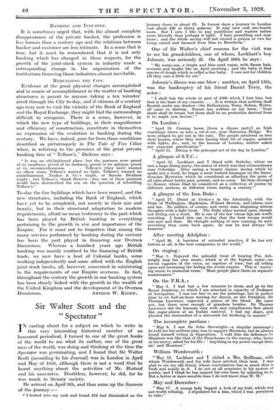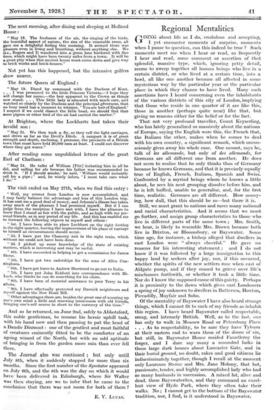Sir Walter Scott and the " Spectator "
TN casting about for a subject on which to write in -11- this very interesting historical number of an honoured periodical, I turned to one of the great books of the world to see- what its author, one of the great men of the world, was doing and thinking at the time the Spectator was germinating, and I found that Sir Walter Scott (according to his Journal) was in London in April and May of 1828, although there is not a word that he heard anything about the activities of Mr. Rintoul and his associates. Doubtless, however, he did, for he was much in literary society.
He arrived on April 9th, and thus sums up the finances of the journey :— e I looked into my cash and found £53 had diminished on the
journey down to about £3. In former days a journey to London cost about £30 or thirty guineas. It may now cost one-fourth more. But I own I like to pay postillions and waiters rather more liberally than perhaps is right. I hate grumbling and sour faces ; and the whole saving will not exceed a guinea or two for being cursed and damned from Dan to Beersheba."
One of Sir Walter's chief reasons for the visit was to see his grandchildren, one of whom, Lockhart's boy Johnnie, was seriously ill. On April 10th he says :
" My name-son, a bright and blue-eyed rogue, with flaxen hair, screams and laughs like an April morning ; and the baby is that species of dough which is called a fine baby. I care not for children till they care a little for me."
Johnnie's illness was one blow ; another, on April 15th, was the bankruptcy of his friend Daniel Terry, the actor : " I shall lose the whole or part of £500 which I lent him, but that is the least of my concern.. . . It is written that nothing shall flourish under my -shadow—the Ballantynes, Terry, Nelson, Weber, all came to distress. Nature has written on my brow, ' Your shade shall be broad, but there shall be no protection derived from it to aught you favour.' " On London : " April 19. Coming home [from a dinner party]. an Irish coachman drove us into a cul-de-sac, near Battersea Bridge. We were obliged to get out in the rain. The people admitted us into their houses, where they were having their bit of supper, assisted with lights, &c., and, to the honour of London, neither asked nor expected gratification."
" April 21. Dining is the principal act of the day in London."
A glimpse of S.T.C. :
" April 22. Lockhart and I dined with Sotheby, where we met a large dining party, the orator of which was that extraordinary man Coleridge. After eating a hearty dinner, during which he spoke not a word, he began a most learned harangue on the Samo- thracian Mysteries, which he considered as affording the germ of all tales about fairies past, present, and to come. He then diverged to Homer, whose Iliad he considered as a collection of poems by different authors, at different times during a century.
A glimpse of the Iron Duke :
" April 27. Dined at Croker's in the Admiralty, with the Duke of Wellington, Huskisson, Wilmot Horton, and others, outs and ins. No politics, of course, and every man disguising serious thoughts with a light brow. The Duke alone seemed open, though not letting out a word. He is one of the few whose lips are worth watching. I heard him say to-day that the best troops would run now and then. He thought nothing of men running, he said, providing they came back again. In war he had always his reserves."
After meeting Adolphus : " April 30. A barrister of extended practice, if he has any talents at all, is the best companion in the world."
On singing :
" May 1. Enjoyed the splendid treat of hearing Mrs. Ark. wright sing her own music, which is of the highest order—no forced vagaries of the voice, no caprices of tone, but all telling upon and increasing the feeling the words require. This is ' marry- ing music to immortal verse.' Most people place them on separate maintenance."
On the P.R.A. : " May 3. I had but a few minutes to dress, and go to the Royal Academy, to which I am attached in capacity of Professor of Antiquities. I was too late to see the paintings, but in perfect time to sit half-an-hour waiting for dinner, as the President, Sir Thomas Lawrence, expected a prince of the blood. He came not, but there were enough of grandees besides. Sir Thomas Lawrence did the honours very well, and compliments flew about like sugar-plums at an Italian carnival. I had my share, and pleaded the immunities of a sinecurist for declining to answer."
The incomplete partisan :
" May 8. I saw Sir John Sievwright—a singular personage ; he told me his uniform plan was to support Ministers, but he always found himself voting in Opposition. I told him his deference to Ministers was like that of the Frenchman to the enemy, who, being at his mercy, asked for his life : ' Anything in my power except that, sir,' said Monsieur."
William Wordsworth : " May 12. Lockhart and I visited a Mrs. Quilliman, with whom Wordsworth and his wife have pitched their tent. I was glad to see my old friend, whose conversation has so much that is fresh and manly in it. I do not at all acquiesce in his system of poetry, and I think he has injured his own fame by adhering to it. But a better or more sensible man I do not know than W. W.
May and December :
" May 17. A young lady begged a lock of my hair, which was not worth refusing. I stipulated for a kiss, which I was permitted to take."
The next morning, after dining and sleeping at Holland House : " May 18. The freshness of the air, the singing of the birds, the beautiful aspect of nature, the size of the venerable trees, all gave me a delightful feeling this morning. It seemed there was pleasure even m living and breathing, without anything else. We (i.e., Rogers and I) wandered into a green lane bordered with fine trees, which might have been twenty miles from a town. It will be a great pity when this ancient house must come down and give way to brick works and brick-houses."
Not yet has this happened, but the intensive golfers draw nearer.
The future Queen of England :
" May 19. Dined by command with the Duchess of Kent. . I was presented to the little Princess Victoria,—I hope they will change her name,—the heir apparent to the Crown as things now stand. . . . This little lady is educated with much care, and watched so closely by the Duchess and the principal governess, that no busy maid has a moment to whisper, You are heir of England.' I suspect if we could dissect the little head, we should find that some pigeon or other bird of the air had carried the matter."
At Brighton, where the Lockharts had taken their invalid son :
" May 21. We then took a fly, as they call the light carriages, and drove as far as the Devil's Ditch. A rampart it is of great strength and depth, enclosing, I presume, the precincts of a British town that must have held 30,000 men at least. I could not discover where they got water."
After reading some unpublished letters of the great Earl of Chatham :
" May 24. He talks of William [Pitt] imitating him in all he did, and calling for ale because his father was recommended to drink it. If I should smoke,' he said, William would instantly call for a pipe ; ' and, he wisely infers, I must take care what I do.' "
The visit ended on May 27th, when we find this entry :
" Well, my retreat from London is now accomplished, and I may fairly balance the advantage and loss of this London trip. It has cost me a good deal of money, and Johnnie's illness has taken away much of the pleasure I had promised myself. But if I can judge from the reception I have met with, I have the pleasure to know that I stand as fair with the public, and as high with my per- sonal friends, as in any period of my life. And this has enabled me to forward the following objects to myself and others : " 1st. I have been able to place Lockhart on the right footing in the right quarter, leaving the improvement of his place of vantage to himself as circumstances should occur.
" 2d. I have put the Chancery suit in the right train, which without me could not have been done.
" 3d. I picked up some knowledge of the state of existing matters, which is interesting and may be useful.
" 4th. I have succeeded in helping to get a commission for James Skene.
" 5th. I have got two cadetships for the sons of Allen Cun- ningham.
" 6th. I have got leave to Andrew Shortreed to go out to India. " 7th. I have put John Eckford into correspondence with Mr. Loch, who thinks he can do something for his claim.
" 8th. I have been of material assistance to poor Terry in his affairs.
" 9th. I have effectually protected my Darnick neighbours and myself against the New Road Bill.
" Other advantages there are, besides the great one of scouring up one's own mind a little and renewing intercourse with old friends, bringing one's-self nearer in short to the currency of the time."
And so he returned, on June 2nd, safely to Abbotsford, this noble gentleman, to resume his heroic uphill task, with his hand now and then pausing to pat the head of a Dandie Dinmont : one of the gentlest and most faithful of creatures eminently fitted to be the comforter of an ageing wizard of the North, but with an odd aptitude of bringing in from the garden more rain than ever fell there.
The Journal also was continued ; but only until July 8th, when it suddenly stopped for more than six months. Since the first number of the Spectator appeared on July Stb, and the 8th was the day on which it would have been delivered in Edinburgh, where Sir Walter was then staying, are we to infer that he came to the conchision that there was not room for both of them ?
E. V. LUCAS.



















































































































 Previous page
Previous page